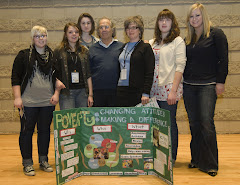Begin by talking directly with poor and low-income people, especially those involved in self-help, community-based organizations. Learning about their lives, the challenges they wrestle with, and the solutions they are working toward will strengthen any other advocacy you participate in. Share what you discover with those you know - and consider what more you can do to work with them.
Write a letter to your local newspaper, alerting the editors to the information you've learned about poverty in America, and what is being done to eliminate it. Refer to a related issue currently being discussed in your local newspaper or media, and include poverty statistics pertaining to your region or state. Visit www.census.gov to select a state and get facts on poverty from the U.S. Census Bureau.
Ask local reporters to cover the state of poverty in your community and the positive steps being taken to help those in need. Point them to the facts and figures contained in this Web site for background information.
Submit an article to the newsletter published by your church, synagogue, mosque or house of worship about poverty in your community, and about successful initiatives that are bringing long-term results. Learn more by reading about successful local efforts.
PROMOTE JUSTICE-BASED SOCIAL POLICIES
Follow local politics, and tell your local elected officials that you support policies aimed at permanent solutions to poverty in your community and your nation. Time and again, letter-writing campaigns have demonstrated that, when people combine their energies in a single purpose, the results are magnified.
Organize a letter writing campaign through your local community about an issue of local concern. If you volunteer or work with a charitable service organization, suggest that others who participate in that work get involved in advocacy on the issues that keep people trapped in a cycle of poverty.
Question candidates on their plans to address poverty in your state and nation, vote your conscience -- and hold politicians to their promises if elected.
Attend or help organize neighborhood meetings and public hearings and give testimony on programs and policies affecting low-income families in your community, sharing information you've learned about solutions for poverty in America.
TALK WITH ELECTED OFFICIALS AND OTHER POLICY MAKERS
Join a local advocacy group that urges elected officials to enact just social policies. Lend your support to organizations that work with people in poverty to bring about positive changes at the state and federal level. One such group is the Center for Community Change (www.communitychange.org), which helps low income people build effective organizations that can change their communities and public policies.
Learn how one organization helped low-income residents become active participants in the political process.
Organize site visits for local leaders and the media to witness first-hand those programs in your community that are successfully addressing the problems of poverty.
Stay informed about what Congress is doing to address poverty on a national level. Write or call your senators or representatives, asking what their stance is on pending legislation affecting low-income Americans. The more elected officials hear from voters about a particular issue, the more they take notice.
You can call anyone in Congress by phoning the Capitol Switchboard at (202) 224-3121. You can send a letter to any senator by addressing your envelope to The Honorable (Senator's name), United States Senate, Washington, DC 20510, or to any representative by writing to The Honorable (Representative's name), U.S. House of Representatives, Washington, DC 20515.
You can send e-mail to your Representative by visiting www.house.gov/writerep/; e-mails to your Senators can be sent by visiting www.senate.gov/.
Visit www.usccb.org/sdwp to find current information about issues pending in Congress that have an impact on the lives of poor and low income people .
PROMOTE UNDERSTANDING
Become a personal advocate for and with those living in poverty by developing more compassion in the way you talk to others about the reality of poverty in America. Such small changes, when multiplied, can lead to larger changes in the way society sees and treats people experiencing poverty.
Help those directly affected by proposed legislation to get involved. Through your local coalition, mobilize the very people experiencing poverty to contact officials at all levels of government. Volunteer to help with a registration drive in your local community. Most especially, encourage low-income families and the working poor to register and to vote.










No comments:
Post a Comment